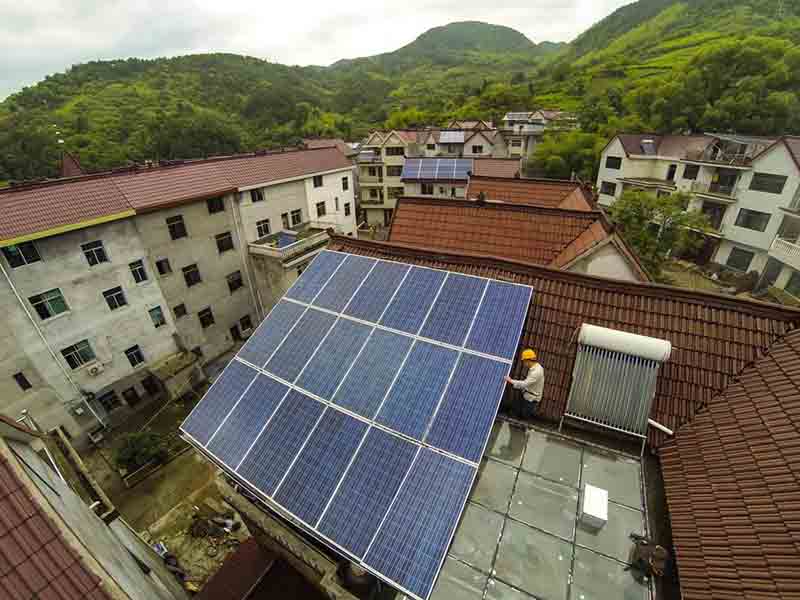
Adam Minter writes on Bloomberg that ever since U.S. President Donald Trump announced the U.S. would withdraw from the Paris climate treaty, there's been lots of overheated talk about how China will now seize leadership of the global fight against climate change. It's easy to see why: Chinese leaders face pressure to address rampant pollution and have the resources to implement massive clean-energy projects, such as the world's largest floating solar array, launched on a Chinese lake last week. But if China truly is to lead the world in promoting renewables, it's going to have to think small as well as big. The real opportunity is in pushing innovative greentech -- especially the type that fits on a rooftop...At the end of 2014, for instance, rooftop solar accounted for just 17 percent of China's installed solar capacity...China will install 7 to 8 gigawatts of rooftop solar in 2017 -- an amount equal to the cumulative installed rooftop solar base up to 2016...China's National Energy Administration is piloting a program in rural areas to boost the incomes of two million poor Chinese, using rooftop solar...State Grid Corporation of China, a power monopoly that dominates 26 of China's 32 provinces, has awakened to the business opportunity that rooftop solar presents and is working to make it technically and financially feasible for households and businesses.
Reuters reports that several Asian nations are seeking to bolster informal alliances among themselves, regional diplomats and officials said, unsettled by growing fears that the United States could not be relied on to maintain a buffer against China's assertiveness. Countries including Australia, Japan, India and Vietnam are quietly stepping up discussions and co-operation, although taking care they do not upset Beijing, the diplomats said. No one was yet talking about a formal alliance. Inaugurating the weekend Shangri-La Dialogue, the region's premier security forum, Australian Prime Minister Malcolm Turnbull said: "In this brave new world we cannot rely on great powers to safeguard our interests. "We have to take responsibility for our own security and prosperity, while recognizing we are stronger when sharing the burden of collective leadership with trusted partners and friends." His comments resonated through the three-day meeting that ended on Sunday. Regional officials and analysts said there was growing mistrust of the administration of U.S. President Donald Trump, especially because of his withdrawal from the Trans-Pacific Partnership (TPP) on trade and then, last week, the pullout from the Paris climate accord. Many fear Trump is signaling a deeper retreat from a traditional U.S. security role that has underpinned the region for decades.
- Reuters reports that China has expressed its strong dissatisfaction with what it labeled "irresponsible remarks" on the South China Sea by U.S. Secretary of Defense James Mattis during a security forum at the weekend. Mattis accused China of having contempt for other nations' interests and disregarding international law. He told the annual Shangri-La Dialogue in Singapore that the construction and militarization of artificial islands in the South China Sea undermined regional stability. Chinese Foreign Ministry spokeswoman Hua Chunying said China's construction of facilities in the Spratly archipelago in the South China Sea was aimed at improving working conditions for people stationed there, maintaining sovereignty and fulfilling China's international responsibilities. The sovereign activities undertaken by China had nothing to do with militarization, Hua said in remarks posted on the ministry's website late on Sunday.
- 2017-06-02 Trump Hands the Chinese a Gift: The Chance for Global Leadership
- 2017-06-01 As U.S. retreats, EU and China seek climate leadership at summit
- 2017-05-31 China Gauge of Factory Activity Holds Steady in May
- 2017-05-30 A wild ride awaits Branstad in China
- 2017-05-26 China's reforms not enough to arrest mounting debt: Moody's
- 2017-05-26 China's reforms not enough to arrest mounting debt: Moody's
- 2017-05-25 U.S. Warship Sails Near Island Claimed by Beijing in South China Sea
- 2017-05-24 Larry Summers: Trump’s ‘China deal’ is only a good deal for China
- 2017-05-23 Google AI beats Chinese master in ancient game of Go
- 2017-05-22 China and India Make Big Strides on Climate Change
- Bloomberg Rest Assured. China Has Its Economy's Back
- Los Angeles Times Brown's first stops in China are in cities that look a lot like California
- New York Times Turning Against Trump: How the Chinese Covered the Climate Pact Exit
- New York Times Chinese City With a Russian Past Struggles to Preserve Its Legacy
- Wall Street Journal China's Tencent Casts Wide Net in Search for Tech's Next Big Thing
- Wall Street Journal More Chinese Companies Turn to Shadow Banking
- Bloomberg China's Shenhua, Guodian Said to Mull $267 Billion Power Merger
- CNBC US missile defense triggers alarm in Russia, China as North Korea issues new warnings
- The Diplomat Singapore Unveils New ASEAN Defense Initiatives Ahead of Chairmanship
- The Diplomat Why China and Russia Continue to Oppose THAAD
- www.huffingtonpost.com Love & Devotion in Chinese Political Culture
- nationalinterest.org Kim Jong-un Isn't Crazy and China Doesn't Have a Solution
- CNBC China PM's 'dream team' should be Asia, not Europe
- Fortune Has Donald Trump Ceded Global Leadership to China's Xi Jinping?
- www.vox.com Trump pulling out of the Paris climate agreement is great news … for China
